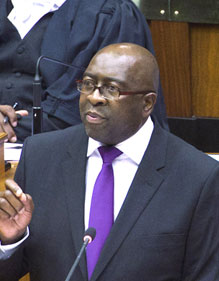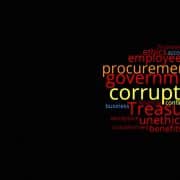|
Getting your Trinity Audio player ready...
|
 Finance minister Nhlanhla Nene has tabled his first medium-term budget. Speaking in Parliament yesterday, Nene showed that he was not afraid to make some tough decisions. Analysts have shown approval for his forthright stance on the country’s overspending and poor economic growth.
Finance minister Nhlanhla Nene has tabled his first medium-term budget. Speaking in Parliament yesterday, Nene showed that he was not afraid to make some tough decisions. Analysts have shown approval for his forthright stance on the country’s overspending and poor economic growth.
“When we tabled the 2014 budget in February, we expected the economy to grow by 2.7% this year – the revised estimate is 1.4%. The Treasury projects that growth will reach 3% in 2017,” Nene said, attributing the revision to a global economic downswing as well as challenges specific to South Africa, such as skills shortages and administrative shortcomings.
“Nene has displayed the sheer guts required to be a good minister of finance,” said tax professor Matthew Lester of Rhodes University. “He didn’t kick for touch or take the easy ways out. He has attacked the fundamental issue – RSA is spending too much.”
This means, said Lester, that Nene has not allowed himself to be “dominated by politicians and instructed to place a higher burden on the taxpayer or just increase national debt until RSA disappeared into oblivion”.
Read Nene’s full speech online, or visit the National Treasury’s budget page for more information.
Spending will not increase
Since Corruption Watch's inception, 34% of all reports we've received are related to abuse of public money, such as wasteful expenditure. Of these reports, 50% of them arrived between October 2013 and now – which would seem to indicate that former finance minister Pravin Gordhan's tough talk in last year's mini budget speech has not had much of an impact.
“The budget framework we table today is focused on restoring balance to the nation’s finances, bolstering investment, and achieving better value for money in public expenditure,” said Nene.
The minister asserted that there would be no bail-outs for state-owned entities such as South African Airways – which has had its fair share of assistance at the taxpayer’s expense – and the Post Office, which according to media reports is in dire straits.
He also said that the government would not extend any more new debt guarantees to Eskom. This means that any borrowing in the future – which he estimated at R250-billion – would have to be supported by guarantees that already exist. The state would provide a minimum of R20-billion of funding to the utility – this would be raised through the sale of non-strategic assets, he said.
Nene took the bold step of announcing measures to attack the national debt that don’t place too much of a burden on taxpayers, although they will have to cough up more from 2015. Details of the increase will be laid out in the main budget speech in February.
He said that government expenditure proposals have been reduced by R10-billion for 2016/17 and R15-billion for R2016/17. This will be achieved partly by keeping the budget for non-essential goods and services fixed at the current rate. Not only that, but there would be no increase in staff complements for the next two years, and funding for vacant posts would be reviewed and/or withdrawn.
“Across national departments, planned expenditure on travel and subsistence, conference venues and catering has been cut,” said Nene. “Advertising and communications budgets have been reduced. Allocations for consultant services have been capped. These steps will contribute savings of about R1.3-billion over the next two years.”
Wasteful expenditure a no-no
“We will not balance the budget on the backs of the poor,” Nene warned. “This means that intensive effort has to be focused on achieving the intended savings and maximising efficiency. “
He announced that procurement costs are to come under the spotlight, and a public procurement review would be released in November, outlining reforms to be phased in over the next five years.
He also said that the disbursement of infrastructure grants will be linked to the efficient delivery of capital projects – in other words, municipalities must show that they have planned and budgeted effectively before a cent is handed over.
“We will continue to fight waste and corruption, supported by our audit institutions and stringent monitoring and reporting requirements,” Nene said, adding that more details would be provided in February’s budget speech.
The Citizen reports that in a pre-speech media briefing, Nene said that citizens and government employees alike would have to tighten their belts. The habit of providing multiple meals at meetings would be stopped or scaled down. “And where ministers previously flew business class they could fly economy”.








